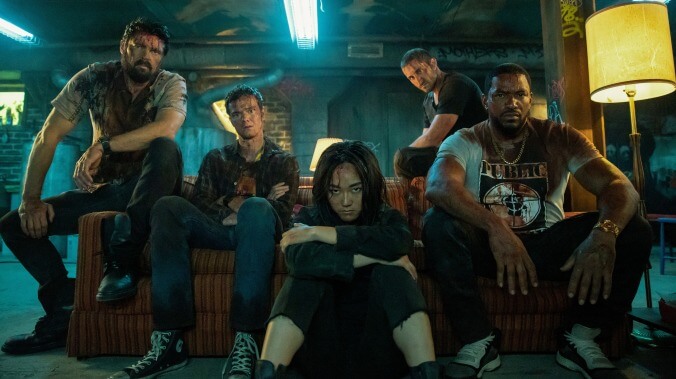The Boys are back, badass, and even better in a dark and timely season 2


Even faster-than-sound superheroes can fall a little behind the times. Take Homelander (Antony Starr), the sadistic and disturbed Superman who leads America’s team of ostensibly heroic do-gooders, The Seven: Halfway through season two of The Boys, Amazon’s pitch-black deconstruction of superhero tropes (based on Garth Ennis’ equally dark comic series), the narcissistic caped crimefighter realizes social media is turning against him. Used to being universally adored, he can’t understand why his $100 million PR campaign is being undermined by memes and viral tweets. “Emotion sells. Anger sells,” the person responsible for his crumbling image explains, as though reading the business strategy of Fox News and its many-headed hydra of 21st-century imitators. “You have fans. I have soldiers.” As wannabe authoritarians have always known, why strive for goodness, when hate is so much more effective?
The best thing about the second season of The Boys is how smartly it adds complexity and depth to its characters and stories. The show began as a fun but fairly weightless exercise in gory, meta nihilism: tough guy Billy Butcher (Karl Urban) and his nebbish of a new recruit, Hughie (Jack Quaid), seeking to get revenge for the deaths of their loved ones at the hands of the publicly noble but privately craven superheroes of The Seven, a team paid for and run by the nefarious Vaught corporation. The show derived a lot of wit and energy from its gonzo premise, but didn’t do much beyond gruesome action and playing with the subversion of tropes that had already been subverted since Alan Moore’s Watchmen came out in the ’80s. (As we said at the time of its premiere, “The Boys is all about tearing down false idols, but it doesn’t build up anything in their place.”)
Thankfully, the course correction not only goes beyond enriching the “power corrupts” and “bad people are still people, too” themes (though these carry on through the new episodes). The Boys has turned its attention to a variety of new ideas, but none so potent as the manipulation of digital media and how cults of personality are formed and maintained. (Wonder what current events sparked that emphasis?) In the new season, it’s not just Starlight (Erin Moriarty) as the new member of The Seven any more, her high-minded ideals getting chewed up by the machinery of Vaught. She’s joined by savvy new member Stormfront (Aya Cash), whose millennial-influencer attitude raises the hackles of her on-message corporate handlers. Starlight initially thinks she’s found a new common-sense ally (“You wanna talk about girl power?” Stormfront spits at her bosses’ plan for a hokey “girls get it done” campaign, gesturing to her form-fitting leather uniform. “Let’s talk about getting some pockets.”) But as with most things on this show, not all is what it seems, and Stormfront’s dynamic with her new teammates becomes one of the best storylines of the season.
The fractured friendship between Hughie and Butcher threatens to weigh down the early going, as the pair ended last year with Butcher abandoning Hughie and the rest of the team: Tomer Capon’s Frenchie, Laz Alonso’s long-suffering M.M., and Karen Fukuhara’s silent Kimiko. But it’s not long before Butcher is back, and the gang is once more struggling to take down Vaught and the supers—only now as wanted outlaws, hiding out beneath a Manhattan pawn shop. Hughie and Starlight are similarly on the outs, still working together to expose Vaught’s machinations but their relationship undone by the reveal that he was spying on her this whole time. If Starlight is the path of moral compromise, her time with The Seven leaving her jaded, frustrated, and increasingly flexible with her ethical boundaries, then Hughie is the stubborn voice of conscience. The Boys finally has something to replace its false idols—Hughie’s essentially impossible path of hope and doing what’s right, regardless of the likely outcome. Even Homelander, the epitome of amoral, self-serving megalomania, gets confronted with an unexpected burst of emotions in the form of his newly discovered son.
None of which should be taken to mean the show’s foundation of smarmy satire, brutal violence, and comic-book intrigue is any less pulpy—or fun—than it was in season one. From the opening strains of “Sympathy For The Devil” that kick off the season, The Boys remains a series less interested in subtlety than in over-the-top imagery and go-for-broke storytelling. Whereas Preacher, the other series adapted from Ennis’ work, often felt like it was stalling out or spinning its wheels, showrunner Eric Kripke keeps the pace and plotting rushing forward, with inspired side missions (a Billy Joel-scored road trip and a confrontation with an old nemesis in a psychiatric facility are particularly good) and wild action. When a banished member of The Seven, subpar Aquaman knockoff The Deep (Chace Crawford), reappears atop a whale to threaten the crew, things quickly get enjoyably absurd.
Likewise, the show’s snarky tone and penchant for broad sight gags remains undimmed. When a Scientology-like group approaches The Deep at his most vulnerable and encourages him to try a hallucinogenic tea, it soon smash cuts to him tripping balls while Goo Goo Doll’s “Iris” blasts from his speakers. (The Deep’s entire arc is so separate from the rest of the show, however, that it often feels shoehorned in.) Similarly, when Homelander gets annoyed another hero beats him to the punch—literally, kills a person before he gets the chance—he’s met with a breezy, “You snooze, you lose.” That this sardonic vibe now sits so much more effectively alongside the season’s rich character study is a testament to Kripke’s handling of such tonal whiplash. A late-season installment that delves into the backstory of Frenchie with nuance and uncharacteristic sensitivity—while still delivering the high-octane violence—is a high-water mark for the series.
As a whole, the second season of The Boys is a solid improvement on the first: Smarter, sharper, and more engaged with its stories and characters—not to mention Cash swooping in and pulling off a sneak MVP performance with her devilishly dry turn as Stormfront. But even Urban’s Butcher, so single-minded and reductive in season one, finally gets to start digging into some ambiguities with his grizzled antihero, teasing out the guy’s darker side while finding ways to reveal some weaknesses. If season one was mostly empty spectacle—a bunch of super-powered assholes unleashing heat-vision blasts and concrete-shattering punches—now we’ve got a reason to care, a retort to the bleak nihilism that previously drove things along. The supers may be the basis for this show, but it’s the humanity that powers it.